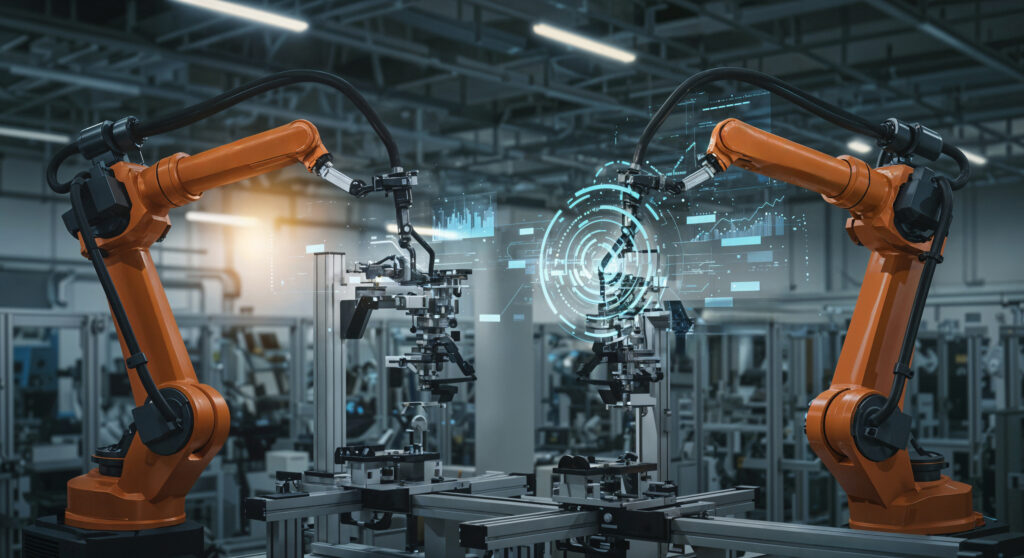In recent decades, automation technology has become an indispensable part of modern companies. It encompasses a wide range of technologies and procedures aimed at optimizing processes, increasing efficiency and minimizing human error. At a time when competitiveness and cost efficiency are crucial to a company's success, automation plays a central role.
Table of contents

Companies that implement automation technologies can not only increase their production capacities, but also improve their ability to respond to market changes. One example of the importance of automation technology can be found in the manufacturing industry. Here, automated machines and robots enable the precise and rapid production of goods.
These technologies help to reduce production costs and increase product quality at the same time. In addition, companies can use automation technology to make their production lines more flexible, allowing them to respond more quickly to customer requirements and offer customized solutions. In this context, the low code automation an innovative approach to implementing automation without in-depth programming knowledge.
Key Takeaways
- Automation technology plays a decisive role in companies when it comes to optimizing processes and increasing efficiency.
- Companies benefit from automation technology through cost savings, quality improvements and increased productivity.
- Automation technology is used in a wide range of applications in companies, from production to warehouse management.
- The implementation of automation technology in companies poses challenges such as high costs and resistance to change.
- In Industry 4.0, automation technology plays a central role in the networking and digitalization of production processes.
The advantages of automation technology for companies
The benefits of automation technology are manifold and range from cost reductions and efficiency increases to improved product quality. One major advantage is the reduction in operating costs. By using automated systems, companies can reduce personnel costs and increase production speed at the same time.
This not only leads to higher machine utilization, but also to a significant reduction in labour costs. Another advantage is the increase in productivity. Automated systems work continuously and without breaks, which means that companies can significantly increase their production capacities.
This is particularly important in industries with high competitive pressure, where the ability to produce quickly and efficiently is crucial to market success. Automation also enables more precise control of production processes, resulting in consistently high product quality. Sources of error that can arise due to human error are largely eliminated by automated systems. A proven platform for such automated workflows is Automation with n8nwhich is particularly characterized by its flexibility and expandability.
The various applications of automation technology in companies

The applications of automation technology are extremely diverse and can be found in almost all industries. In the manufacturing industry, for example, robots are used to automate assembly processes. These robots can perform complex tasks such as welding, painting or assembling components while ensuring a high level of precision.
In the food industry, on the other hand, automated systems are used to control production lines and monitor the quality of products. Another example of the use of automation technology is the logistics sector. Here, automated warehouse systems are used to optimize the flow of goods and increase efficiency when picking and shipping products.
By using automated vehicles and drones, companies can significantly improve their supply chains and reduce costs at the same time. Automation technology is also increasingly being used in the service sector, for example in the form of chatbots or automated customer service systems that enable companies to look after their customers more efficiently.
The challenges of implementing automation technology in companies
Despite the numerous advantages, the implementation of automation technology also brings challenges. One of the biggest hurdles is often the high initial investment required to purchase and install modern automation systems. Many companies are therefore reluctant to invest in these technologies, fearing that the costs will not be recouped quickly enough.
Another problem is the integration of new systems into existing processes. Companies often have to fundamentally rethink and adapt their workflows in order to take full advantage of automation. This can lead to resistance from employees, especially if they fear that their jobs could be replaced by machines.
Careful planning and training are therefore essential to ensure that all employees accept the new technologies and can use them effectively.
Industry 4.0 represents a paradigm shift in production in which intelligent technologies and the Internet of Things (IoT) play a central role. In this context, automation technology is of crucial importance as it enables companies to network their production processes and control them in real time. By using sensors and data analysis, companies can gain valuable information about their production processes and use this to optimize their processes.
One example of the role of automation technology in Industry 4.0 is the use of predictive maintenance. This involves collecting and analyzing data from machines in order to predict when maintenance work is required. This enables companies to minimize downtimes and extend the service life of their machines.
In addition, the use of automated systems means that individual customer requirements can be implemented more quickly, which creates a competitive advantage.
Choosing the right automation technology company for a company's needs
Choosing the right automation technology provider is a crucial step for the success of a company. There are numerous providers on the market offering different solutions. When making a selection, companies should consider various factors, including the provider's experience, the range of services offered and references from similar projects.
Another important aspect is the flexibility of the provider. As technologies and market requirements are constantly evolving, it is crucial to choose a partner that is able to offer customized solutions and adapt to changing conditions. In addition, the chosen company should offer comprehensive support and training services to ensure that the company's employees are optimally prepared to deal with the new technologies.
The future of automation technology in companies

The future of automation technology promises exciting developments and innovations. With advances in areas such as artificial intelligence (AI) and machine learning, it will be possible to develop even more intelligent and autonomous systems. These technologies could help to further optimize processes and create new business models.
One example of future developments is the increased use of collaborative robots (cobots) that can work together with humans. These robots are designed to take over tasks that are dangerous or ergonomically unfavorable for humans. As a result, companies can not only increase their efficiency, but also create a safer working environment.
In addition, the integration of IoT technologies is expected to increase further, enabling even closer networking of machines and processes.
The impact of automation technology on the world of work in companies
The introduction of automation technology has a profound impact on the world of work in companies. On the one hand, it leads to the creation of new jobs in the field of technology and IT, as qualified specialists are needed to develop and maintain automated systems. On the other hand, however, there are also concerns that many traditional jobs could be replaced by machines.
To meet these challenges, it is important that companies invest in the further training of their employees. Training programs should aim to prepare employees for new technologies and provide them with skills that are in demand in an increasingly automated working world. Companies should also promote a corporate culture that supports innovation and encourages employees to actively participate in change processes.
This is the only way to ensure that both companies and employees can benefit from the advantages of automation technology.
An interesting article that deals with automation in companies is AI consultants: philosophy and technology in harmony. This article looks at the role of artificial intelligence in the consulting industry and discusses how companies can benefit from this technology. The combination of philosophy and technology is seen as the key to successful automation technology in companies.
FAQs
What is automation technology?
Automation technology refers to the use of technical systems and processes to automate and optimize workflows in companies or production facilities.
What advantages does automation technology offer companies?
By using automation technology, companies can make their production processes more efficient, improve the quality of their products and reduce costs.
Which companies use automation technology?
Automation technology is used in various sectors, including the automotive industry, food production, the pharmaceutical industry and the logistics sector.
Which technologies are used in automation technology?
In automation technology, robots, sensors, control systems, machine and plant engineering and software solutions are used to automate and monitor processes.
What are the trends in automation technology for companies?
Current trends in automation technology include the integration of artificial intelligence, the networking of machines and systems (Industry 4.0) and the development of flexible and modular production systems.

Pingback: Efficient AI automation for lead generation